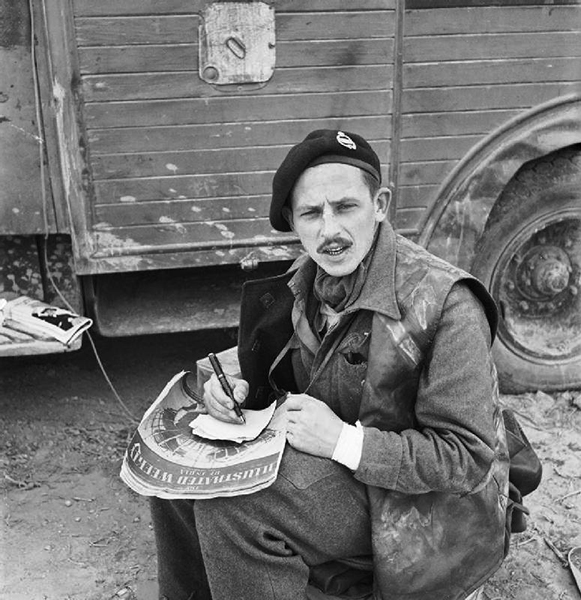Gardner, Philip John "Pip"
- Date of birth:
- December 25th, 1914 (Sydenham/London, United Kingdom)
- Date of death:
- February 15th, 2003 (Hove, United Kingdom)
- Service number:
- 132595
- Nationality:
- British
Biography
Military career:
1934: Hong Kong Volunteer Defence Force
1938: Westminster Dragoons
March 1940: Royal Tank Regiment
September 1940: Irregular Warfare School Lochailort
April 1941: 4th Royal Tank Regiment
June 1942: Prisoner of war during Battle of Gazala, subsequently interned in Chieti, Fontanellato, Stalag IV B and Stalag 79.
1945: Liberated
Philip Gardner was cremated in the Hove Crematorium.
Do you have more information about this person? Inform us!
- Period:
- Second World War (1939-1945)
- Rank:
- Second-Lieutenant
- Unit:
- 4th Battalion Royal Tank Regiment, 32nd Army Tank Brigade, 70th Infantry Division, British Army
- Awarded on:
- October 21st, 1941
Recommended by:
Lt.Col. W.C.L. O’Carroll, Comd. 6th Royal Tank Regiment - 21.6.41
- Period:
- Second World War (1939-1945)
- Rank:
- Acting Captain
- Unit:
- 4th Battalion Royal Tank Regiment, 32nd Army Tank Brigade, 70th Infantry Division, British Army
- Awarded on:
- February 10th, 1942
- Awarded for:
- Operation Crusader
Citation:
"His Majesty The King has approved the award of the Victoria Cross to Captain Philip John Gardner, of the 4th Royal Tank Regiment, for most conspicuous bravery and outstanding devotion to duty at Tobruk on 23rd November 1941.
Captain Gardner was ordered to take two tanks to the assistance of two armoured cars which were out of action and under fire, close to the enemy forces. On arriving at the scene he found the two armoured cars halted two hundred yards apart, being gradually smashed to pieces by heavy fire at close range. He ordered one of his tanks to give covering fire whilst he manoeuvred his own tank close to the foremost car. In the face of intense anti-tank and machine-gun fire he dismounted and secured a tow rope from his tank to the first armoured car. Finding a brother officer desperately wounded beside the car, he lifted him onto it and gave the order to tow. The rope then broke and, as there was no other, he returned to the car to assist the wounded officer, and was himself wounded in the arm and the leg. Despite this he transferred the officer to his tank, climbing up beside him to hold him on. During this time the tank as penetrated by shellfire and the loader killed, while the remainder of the crew of the armoured car were also killed.
Captain Gardner, himself wounded, in saving the life of his brother officer, displayed courage, determination and complete disregard for his own personal safety, such as have rarely been equalled in the annals of the service."
No. 1193
Presented on 18 May 1945 by King George VI at Buckingham Palace.
"His Majesty The King has approved the award of the Victoria Cross to Captain Philip John Gardner, of the 4th Royal Tank Regiment, for most conspicuous bravery and outstanding devotion to duty at Tobruk on 23rd November 1941.
Captain Gardner was ordered to take two tanks to the assistance of two armoured cars which were out of action and under fire, close to the enemy forces. On arriving at the scene he found the two armoured cars halted two hundred yards apart, being gradually smashed to pieces by heavy fire at close range. He ordered one of his tanks to give covering fire whilst he manoeuvred his own tank close to the foremost car. In the face of intense anti-tank and machine-gun fire he dismounted and secured a tow rope from his tank to the first armoured car. Finding a brother officer desperately wounded beside the car, he lifted him onto it and gave the order to tow. The rope then broke and, as there was no other, he returned to the car to assist the wounded officer, and was himself wounded in the arm and the leg. Despite this he transferred the officer to his tank, climbing up beside him to hold him on. During this time the tank as penetrated by shellfire and the loader killed, while the remainder of the crew of the armoured car were also killed.
Captain Gardner, himself wounded, in saving the life of his brother officer, displayed courage, determination and complete disregard for his own personal safety, such as have rarely been equalled in the annals of the service."
No. 1193
Presented on 18 May 1945 by King George VI at Buckingham Palace.
- Period:
- Second World War (1939-1945)
- Period:
- Second World War (1939-1945)
- Period:
- Second World War (1939-1945)
Sources
- Photo: Wikimedia Commons
- - Page 6086 | Supplement 35316, 17 October 1941 | London Gazette | The Gazette
- Victoria Cross Reference
- The Register of the Victoria Cross - uitgegeven door This Engeland 1997 - ISBN 0906324270
- Speciale dank aan Iain Stewart van The History of the Victoria Cross
- Philip J Gardner VC - victoriacross











